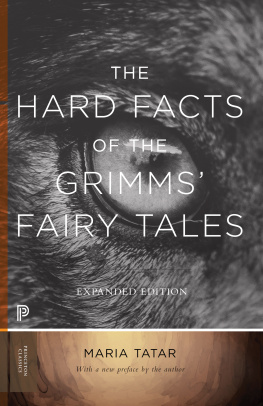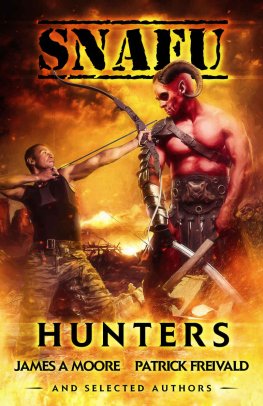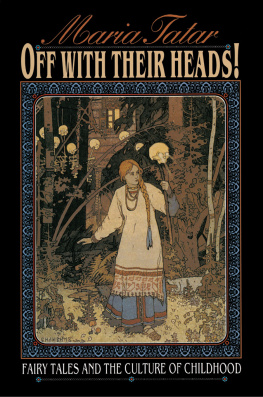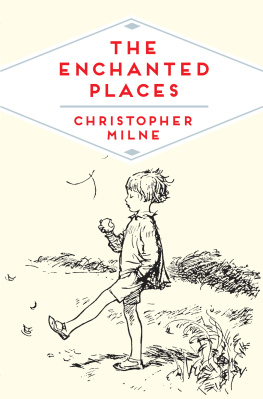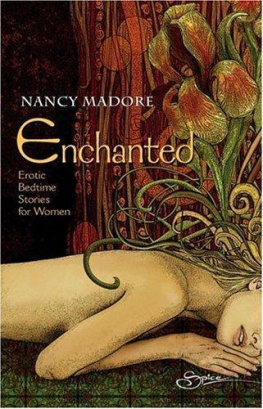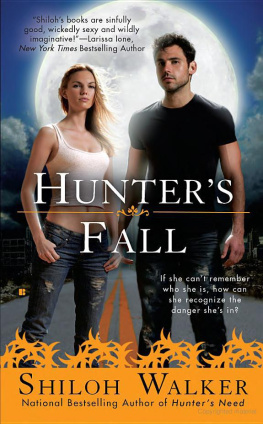Tatar - Enchanted Hunters: The Power of Stories in Childhood
Here you can read online Tatar - Enchanted Hunters: The Power of Stories in Childhood full text of the book (entire story) in english for free. Download pdf and epub, get meaning, cover and reviews about this ebook. year: 2009, publisher: W. W. Norton & Company, genre: Children. Description of the work, (preface) as well as reviews are available. Best literature library LitArk.com created for fans of good reading and offers a wide selection of genres:
Romance novel
Science fiction
Adventure
Detective
Science
History
Home and family
Prose
Art
Politics
Computer
Non-fiction
Religion
Business
Children
Humor
Choose a favorite category and find really read worthwhile books. Enjoy immersion in the world of imagination, feel the emotions of the characters or learn something new for yourself, make an fascinating discovery.

Enchanted Hunters: The Power of Stories in Childhood: summary, description and annotation
We offer to read an annotation, description, summary or preface (depends on what the author of the book "Enchanted Hunters: The Power of Stories in Childhood" wrote himself). If you haven't found the necessary information about the book — write in the comments, we will try to find it.
Tatar: author's other books
Who wrote Enchanted Hunters: The Power of Stories in Childhood? Find out the surname, the name of the author of the book and a list of all author's works by series.
Enchanted Hunters: The Power of Stories in Childhood — read online for free the complete book (whole text) full work
Below is the text of the book, divided by pages. System saving the place of the last page read, allows you to conveniently read the book "Enchanted Hunters: The Power of Stories in Childhood" online for free, without having to search again every time where you left off. Put a bookmark, and you can go to the page where you finished reading at any time.
Font size:
Interval:
Bookmark:
Enchanted Hunters
T HE P OWER OF S TORIES IN C HILDHOOD
M ARIA T ATAR

For my students in Fairy Tales and Childhood
past, present, future
Contents
Secrets beyond the Door: The Story of Bluebeard and His Wives
The Annotated Brothers Grimm
The Annotated Classic Fairy Tales
The Annotated Hans Christian Andersen
The Classic Fairy Tales
Lustmord: Sexual Murder in Weimar Germany
Off with Their Heads! Fairy Tales and the Culture of Childhood
The Hard Facts of the Grimms Fairy Tales
Spellbound: Studies on Mesmerism and Literature
F OR A LONG TIME , I TRIED HARD TO READ MY CHILDREN TO sleep. and then one day the obvious finally dawned on me. Nothing keeps you awake like a good story. Like many parents, I had learned to cope with the demands of child rearing by multitasking. Before long I found myself, a professor of German literature at Harvard University, reading Grimms fairy tales with my children, hoping to find some common ground in two stubbornly discrete rolesparent and college professor. Shamelessly opportunistic, I also found myself reading for a purpose as well as for pleasure, and that worried me.
I began to reflect on my restructuring of the bedtime reading experience, wondering if my brazen pragmatism had not thrown something hopelessly off-kilter, obliterating the magic. Wasnt I supposed to be absorbed in the blissful delights of bedtime reading and in my childrens enraptured gazes as they lost themselves in the many great stories we shared? Werent we supposed to be drinking a magic elixir, experiencing the kind of sensory overload that eliminates the noise of critical inquiry?
Reading a book with a child can produce a contact zone, a term I borrow from Mary Louise Pratt, who coined it in a very different context. For her, a contact zone describes the highly volatile space of colonial encounters, domains where peoples geographically and historically separated come into contact with each other and establish ongoing relations, usually involving conditions of coercion, radical inequality, and intractable conflict. Coercion , radical inequality , and intractable conflict : as I pondered those words, I began to wonder whether there is any more precise way to describe the conditions children face as they are growing up. Maybe the contact zone formed by bedtime reading was more complex and vexed than I had imagined. The notion of connection in a serene, untroubled contact zone suddenly seemed more fantasy than reality, for the gap between child and adult is far more vast than we sometimes care to admit.
If you have read a book to a child, you are aware of how quickly a certain bonding energy seems to reach out from the words on the page. But for the adult, bifocal vision can also take over, even when you lack a professional stake in the book at hand. You are not only absorbed in the storyas the child isbut also reflecting on its implications and ceaselessly monitoring the childs reaction, looking for signs of understanding, mystification, surprise, pleasure, or distress. When we talk with the child about the book, we remove those bifocals for a moment and engage in a conversational reading to create a harmonious, shared experience. Still, if the child becomes totally lost in the story, we remain, as adults, unrepentantly outside it, instinctively engaging our critical faculties even as we catch a glimpsethrough the childs brightening glanceof the cultural innocence that was once our own.
Adam Gopnik has suggested that bedtime reading produces anything but a contact zone. The practice of reading a book with a child paradoxically sets adult and child on two different courses: In childrens literature the grown-up wants a comforting image of childhood, or just a familiar name or story; the child wants a boat, a way out, an example of the life beyond. The parent wants to get back, the child wants to get out. The adult longs for a return to the pleasures of childhood through Wonderland, Neverland, or Narnia, while the child uses those same places as launching pads for moving beyond childish things. Nostalgia drives adults. Children want to light out for new territory and make those symbolic stories work for them, using them as road maps for navigating the real world. Contact zones are often less comfort zones than conflict zones where the wistfully melancholy adult meets the energetic child hankering to be grown up.
The divide that manifests itself through bedtime reading led me to think more deeply about how children read and why. But, as important, the weight-bearing load of childhood classics moved me to reflect on the books we loved when we were young. This volume is devoted to stories that have moved readers to ecstasies, to admiration, to laughter, and to tears. They belong, for the most part, to the official canon of childrens literature, the classics that have been enshrined as cultural capital for the young. They are talismanic and Talmudic, volumes treasured and fetishized, put under pillows for safekeeping but also read to pieces. Held together by rubber bands, duct tape, and rusting paper clips, they serve as companions and compass roses, offering shocks, terrors, and wonders, as well as wisdom, comfort, and sustenance. On a bookshelf in my study sits my own collectionbooks endowed with the aura of the sacred. In my daughters room is a shelf holding seven tattered paperbacks, each oneas we discovered one day while contemplating the setrepresenting an important part of her identity.
Some years ago, Hans Heino Ewers, director of an archive for childrens books in Frankfurt, gave me access to a small locked cabinet holding the collection of childrens books owned by the philosopher Walter Benjamin. I hardly dared touch the volumes and could only bring myself to do so after he insisted that I open the fragile treasures to read the pages once turned by Benjamin. I have rarely felt that kind of reverence, even in the presence of illuminated manuscripts and Gutenberg bibles. It was Benjamin, after all, who told us how children cross over into story worlds, breathing the same air as the characters and mingling with them in their world in ways that adults cannot. He was the philosopher who understood supremely well the value of exploring childrens minds and the worlds they inhabit. As I turned the pages, I could almost hear the rusty hinges of a portal opening into worlds Benjamin had inhabited as a child.
No book on childrens literature can possibly strive to be comprehensive, and I can discuss only a small sample of the rich offerings available to children today. Determined to be guided to titles not just by my own fancies but also by the experiences of others, I conducted hundreds of interviews, formal and informal, with students who took my Harvard University courses on the literary culture of childhood. They may not have been typical child readers, for they were almost all passionate readers for whom books had made a real difference. Yet they were also anything but homogeneous. One young woman from Korea had read Roald Dahl in Southern California at age twelve in order to learn English. A young man from South Dakota, who had turned himself into an expert on Dr. Seuss, had committed nearly a dozen of his books to memory. A Cambridge high-school student auditing the course had read the Harry Potter books aloud every Saturday morning over a three-year period to other children at the local library.
I first encountered many of these books as a child, and then re-encountered them through my children and my students. At first I was stunned by the piety shown by ordinarily irreverent undergraduates for the books they had read in childhood. They insisted on magic, on the incandescent beauty of the stories, and on the Wordsworthian attendant gleams/Of soul-illumination that accompanied their readings. By contrast, I was eager to break the spell, to demystify and disenchant, moving from reading for pleasure to reading for hidden meanings, symbolic codes, and narrative technique. We met halfway, in a contact zone where countless stories were exchanged about the impact of stories. For that reason, this book has been shaped by multiple collaborators and contributors who are, in a very real sense, its coauthors.
Next pageFont size:
Interval:
Bookmark:
Similar books «Enchanted Hunters: The Power of Stories in Childhood»
Look at similar books to Enchanted Hunters: The Power of Stories in Childhood. We have selected literature similar in name and meaning in the hope of providing readers with more options to find new, interesting, not yet read works.
Discussion, reviews of the book Enchanted Hunters: The Power of Stories in Childhood and just readers' own opinions. Leave your comments, write what you think about the work, its meaning or the main characters. Specify what exactly you liked and what you didn't like, and why you think so.

